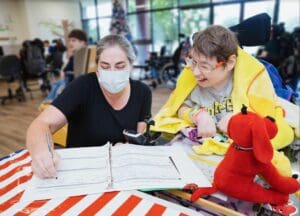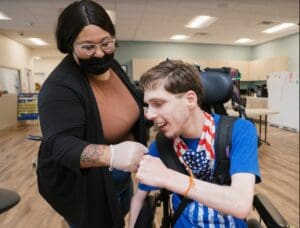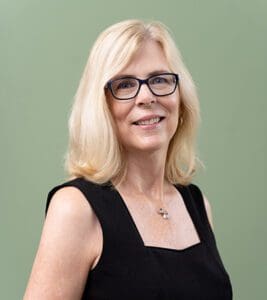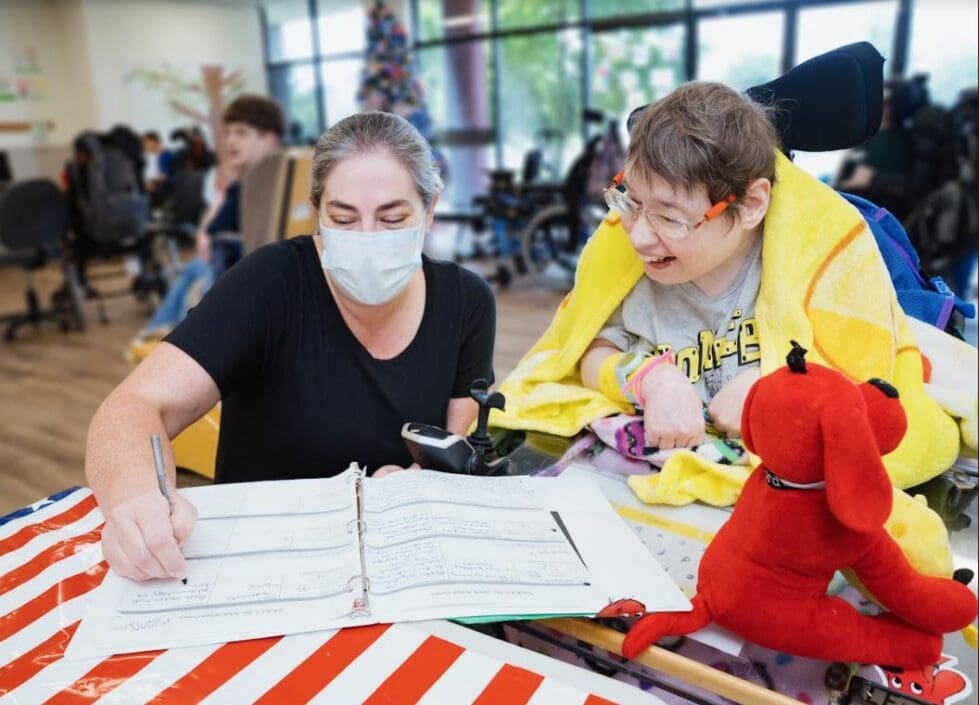
Forward Journey is the state’s adult day program for those with multiple issues.
The only Delaware agency that offers day programs for young adults with multiple and severe disabilities has changed its name and is holding a COVID-delayed open house to show off a facility that was new in 2020.
Forward Journey Adult Day Services, founded in 2006 in a church Sunday School room, was formerly known as C.E.R.T.S., or Collaborative Effort to Reinforce Transition Success.
It began when parents — whose children at 21 would age out of their school system programs — started looking for their children’s next step.
“The world kind of turns upside down,” said Cindy Jenkins, whose son Matthew has been in the program for 14 years.
Those parents didn’t like what little they could find, which strongly resembled warehousing kids in a large room with hospital beds.
Instead, the parents began searching for providers who might be willing to offer something with more support and programming. They didn’t get far.
So they did it themselves.
Forward Journey’s genesis
The first site opened in North Wilmington’s Lutheran Church of the Good Shepherd. Every Friday, the program had to pick up all its equipment so the room for could be used on Sunday. On Mondays, they’d come in early to bring everything back out.
“We started with four people and then we got to eight, and that room was too small,” said Vivian Turner, executive director of Forward Journey.
In 2011, the program moved to a larger site, and then again in 2013. Along the way, it expanded to Kent County with a Smyrna location. Finally, it moved in 2020 to a larger headquarters in New Castle County in the New Castle Corporate Commons.
Six weeks later, the pandemic shut everything down.

Forward Journey now serves 32 clients in New Castle and Kent counties and expects to serve 50 soon. Even so, it would like to expand into Sussex County.
It now has 32 participants — 22 in New Castle and 10 in Smyrna — and expects to quickly add another 17. The average age of their clients is 32.
Most clients cannot communicate verbally, but some can signal yes, no and other things. They often need assistance with eating and using the toilet. Many have several medical issues that require high levels of support.
Matthew Jenkins, for example, had a cerebral hemorrhage before he was born. He’s nonverbal, but can signal yes, no and that he’s hungry. He has been diagnosed with hydrocephalus, seizures, cerebral palsy and, recently, rheumatoid arthritis and acid reflux. He can walk short distances with support.
If Forward Journey didn’t exist, he would have to stay at home, where he would have few activities and little interaction with the outside world.
“At home, he’s very bored because we can’t entertain him like they do,” said Cindy Jenkins, who also chairs the nonprofit’s board.

Vivian Turner
She credits the program with helping Matthew become happier than he ever was at Christiana High School and with improving his ability to walk further. It also gives him something to look forward to.
Jenkins said her son likes the program so much that he won’t try to stand up and head to bed until they tell him he’s going to the program the next morning.
“He gets the biggest smile on his face and then he’s up and ready to go to bed,” she said. “He really enjoys the interaction with the staff because they treat him like he’s just one of their buds. It helps that they actually have him up in walking a little bit, which is difficult for us. The house really doesn’t lend to a lot of walking.”
The point of the program, Turner said, is to help participants engage in a variety of personalized, enriching activities such as arts and crafts, music, and even field trips, while also enhancing functional mobility.
“Our original name just was no longer fitting what we did,” Turner said. “It was a little bit confusing.”
They worked with Blue Blaze Associates to come up with a new name and slogan, “Aspire. Achieve. Celebrate.”
The name “Forward Journey” sets a path for the future, Turney said.
The company’s operating funds largely come from the state of Delaware. It is certified by the Division of Developmental Disability Services to provide day services and is reimbursed a set amount for each client enrolled each day.
That covers about 90% of the nonprofit’s $1,889,337 budget, with fundraising providing the rest.

Forward Journey has to build out its space to accommodate the amount of equipment its clients bring and that the nonprofit needs to safely handle the clients.
The clients are referred from school district programs for the disabled. Most are on Medicaid already, and parents don’t have to pay fees, but usually line up for fundraising efforts, Turner said.
Not everyone who participates in high school programs would want to be in Forward Journey over another program, she said.
“We describe it as the 1% of the population who have the most high level of support needs and would be least likely to be supported at another day program,” Turner said. “Though it’s really a niche, if somebody has a disability and they can walk and speak, this isn’t the program for them.
“Our focus is really on functional mobility, getting people up out of their chairs and into adapted walkers and helping them with those types of things. I feel like there’s a program for everybody, but not every program is for every person.”
Forward Journey uses a new MOVE International program to incorporate movement throughout the day. It’s the first MOVE for Adults model site in Delaware, and the third worldwide.
Many of their clients live at home, while others live in residences for the disabled. They arrive at Forward Journey via transportation from their residence, riding Paratransit through DART, or being dropped off by their parents. There’s also a private ambulance service that will pick up and drop off the patients.
If the agency has a dream, it’s to offer services in all three counties, Turner said.
But finding a site is not easy. At this point, the program can’t move into any old space, and state law prohibits it from being set up at a site where there’s already a residential nursing home, so some sites that may seem obvious are out.
The clients require large amounts of space for their adaptive walkers and activity chairs. The space also needs lots of room and power plugs for equipment such as lift systems to help move clients.
Forward Journey built out its space in the Corporate Commons, which is the location at 52 Reads Way that they plan to show off in their Open House on Oct. 18 from 3 p.m. to 7 p.m.
The program is already running out of space in Smyrna, and Turner hopes to identify a larger space there soon.
Jenkins said the two things she’s like to see the program receive are visibility and recognition for the role it fills for many families.
Because it serves a small population, it has low visibility and that becomes a problem for funding, she said.
That funding keeps the clients out of institutions and improves their quality of life while filling needs for many families.
“It gives me peace of mind. I know he’s in a place where he’s happy. I know he’s in a place where people respect him, which was very important to him. I can go about my day feeling very comfortable that he’s in a great place,” Jenkins said. “I just really can’t say enough that this program is just so helpful to all the participants who are there.”

Betsy Price is a Wilmington freelance writer who has 40 years of experience, including 15 at The News Journal in Delaware.
Share this Post






